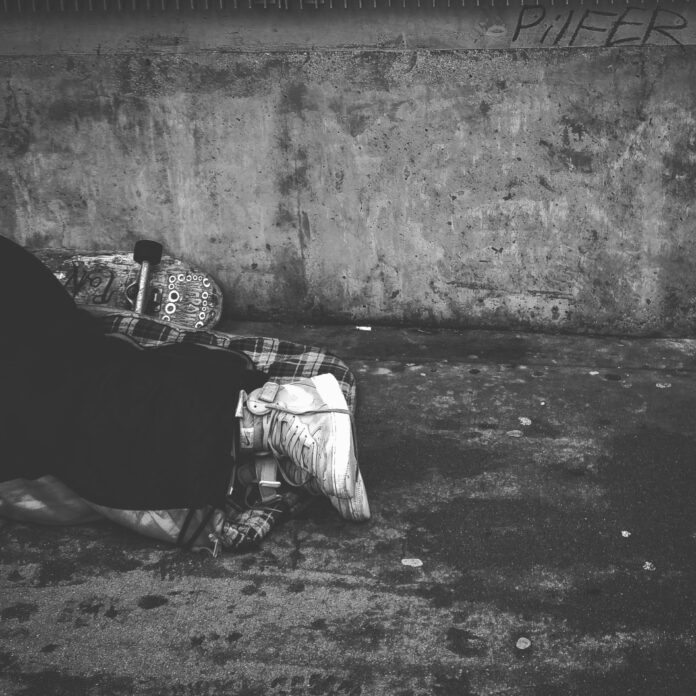Police are segregating the ticketed from the ticketless in Newark’s Penn Station
Michael Williams sat drinking a small cup of coffee he’d bought with the change a few generous people had given him that day. It was around 6 in the evening, and Williams was one of the many homeless people who had been sleeping in the lobby of Newark’s Penn Station.
In the lobby, the seating was segregated. Ticketed customers sat on the spacious side; non-ticketed people were directed to a small side area.
It hadn’t always been like this. Though this seating policy wasn’t new, it hadn’t been enforced.
Suddenly, in the winter of 2017, it was. A security guard asking to see train tickets stood at a checkpoint, making sure no one without a ticket was allowed to sit in the main room.

New Jersey Transit authorities say the abrupt the policy enforcement is to make sure ticketed customers have a place to sit — but some homeless people interviewed in the station see the abruptly enthusiastic enforcement as an attack on their very presence.
“They don’t want us here,” Williams said. “And it’s not right. They just don’t want us sitting over there, that’s all. Ain’t nothing to do with tickets. They never told us to move before.”
Williams and other homeless people suspect that complaints from travelers, and the mere presence of many homeless people at the station, led to the change.
“People don’t like us sitting here,” Williams continued. “They go off to complain, like we don’t have the right to sit here.”
Williams has been coming to the station for over a decade. He lost his job, house and family about 25 years ago, he said, and never recovered.
“It’s hard out here, and a lot of us have been through bad times,” he said. “We shouldn’t be judged; we’re just trying to make a living.”
Sitting opposite Williams was his friend Joanna Washington-Smith, a fellow homeless person who also finds the new enforcement of the seating policy terrible.
“I think it’s clear what they’re trying to do. It’s under the guise of wanting people with tickets to sit down. But they really don’t want us here.”
“They don’t want any of you bummy hobos stinking up the place,” another homeless man joked, as he walked by. He refused to give his name, but all three people being interviewed laughed at his joke.
“But nah, in all seriousness, it’s about begging,” the nameless homeless man said. “People get tired of homeless people begging, so they start complaining to the security. That’s why we got to move over here. They’re sick of homeless lounging around.”
“I think it’s clear what they’re trying to do. It’s under the guise of wanting people with tickets to sit down. But they really don’t want us here.” – Joanna Washington-Smith
Steven Santoro, the executive director of New Jersey Transit, who earns an average of $200,000 a year, was asked about the seating arrangement at the station, traveler complaints and homeless people’s complaints of feeling alienated.
“The New Jersey Transit Police Department works in coordination with local and county homeless and mental health organizations to assist homeless individuals in obtaining much-needed services while enabling New Jersey Transit to maintain safety and security and customer service at Newark Penn Station,” Santoro said. “This partnership further allows the New Jersey Transit Police Department to focus their attention on keeping the New Jersey Transit transportation system safe and secure.”
“Pssst. Bullshit,” the unnamed homeless man said, after he was told about Santoro’s statement. “Bullshit. The police are the main ones who dislike us. They don’t help us. They try to keep us away, and kick us out.”
“They [the homeless], just want someone to blame for the situation they’re in. I take responsibility for my life,” he said. “I was a fool. But the police come to tell the homeless to keep their area clean, and they have every right. It just don’t look good. This is a business and a public place. It’s here to make money, not a shelter for the homeless.”
“The homeless think that this is their home and they have a right to their space. They think it’s ok because they’re homeless. Boo hoo, feel bad for me.”
Why didn’t the three of them sleep at homeless shelters, instead of in a noisy train station that doesn’t want them?
“There are only a limited number of beds at the shelter, and it’s first come first serve,” Washington said. “[Shelters are] also not the best place to be. A lot of stuff goes on in those shelters that goes unnoticed. People get assaulted, robbed of what little they have. Women aren’t safe there, especially. So a lot of times, they just aren’t the best place to live.”
“Yup,” Williams chimed in. “Living on the streets is better, in my opinion.”
Washington riffled through her bag, then pulled out and began counting some coins.
Across the room sat men in business suits, women with kids, and young adults who were talking on their smart phones.
Bethany Evans sat with her preteen daughter and two younger children. She said some of the same things Williams, Washington and their unnamed friend did. Only she wasn’t being ironic.
“They stink,” she charged. “They harass people for money. They harass me for money every time I come here. I’m glad this policy is being enforced now. They shouldn’t have been sitting over here in the first place.”
Her eldest daughter chimed in. “I think it’s really because a lot of people that buy tickets never have anywhere to sit.”
“We come here a lot and can’t sit down because homeless people were lounging around and they really don’t smell good,” she said, laughing. “It’s not really against them. But people with tickets should be able to sit down.”
Here in this room, sitting right across from one other, were people from opposite sides of the economic spectrum.
There were people like Bethany Evans and her daughter, for whom everything seemed to have fallen into place.
And there were people like Michael Williams and Joanna Washington-Smith, who felt targeted and alienated.
There were also people like Steven Santoro, who saw his job as keeping Newark Penn Station safe and secure. And there were people like the police, who wanted to handle the homeless, and get them help.
And there were people like the unknown homeless man, whose jokes were masked in insecurity and pain and hopelessness.

